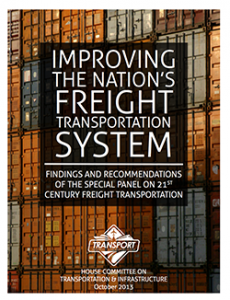The Panel on 21st Century Freight Transportation, established by the House Transportation and Infrastructure Committee in April to examine the current state of freight transportation in the United States and how improving freight transportation can strengthen the U.S. economy, released its final report and recommendations yesterday. The special panel, led by Chairman John Duncan Jr. (R-TN) and Ranking Member Jerrold Nadler ( D-NY), also examined ways to increase the efficiency, safety and overall condition and performance of the nation’s freight network; how technology assists in the movement of freight; and financing options for transportation projects. To examine these issues, the panel held six public hearings and three roundtable discussions; in addition to touring freight facilities in Southern California, the Memphis region, the New York City and Northern New Jersey region, and Norfolk, Virginia.
The final report concluded that Congress should:
- Establish a national freight transportation policy and designate a multimodal freight network;
- Ensure “robust” public investment in all modes of freight transportation and incentivize additional private investment;
- Promote the development of projects that improve the movement of goods;
- Authorize dedicated, sustainable funding for multimodal freight projects through a grant process;
- Identify and recommend sources of revenue to provide investment in the nation’s freight network;
- Develo
p specific funding options for freight transportation projects prior to Congress’s consideration of the surface transportation reauthorization bill in 2014.
ASCE is pleased with the final report and urges Congress to continue to discuss additional revenue options for the Highway Trust Fund. With the Congressional Budget Office anticipating that the Highway Trust Fund will be broke in 2015, the time to figure out how to fund surface transportation programs going forward is NOW.
While revenue for the Highway Trust Fund continues to fall short, the current lack of infrastructure investment has also weakened or nation’s surface transportation system, as well as critical industries and construction employment. Our inability to keep our infrastructure efficient undermines the U.S. competitiveness and economic strength. ASCE’s 2013 Report Card for America’s Infrastructure graded the nation’s infrastructure a “D+” based on 16 categories and found that the nation needs to invest approximately $3.6 trillion by 2020 to maintain the national infrastructure in good condition. The following are the grades and the investment needs by 2020 for the categories related to the movement of freight:
-
- Air received a grade of D and has an estimated investment need of $134 billion;
- Bridges received a grade of C+;
- Transit received a D;
- Roads received a grade of D, and combined with bridges, and transit, have an estimated investment need of $1.7 trillion; and
- Rail received a grade of C+ and has an estimated investment need of $100 billion.
By continuing to under invest in our nation’s freight system an ASCE study, Failure to Act: the Economic Impact of Current Investment Trends in Surface Transportation Infrastructure, found the nation’s deteriorating transportation system will cost the American economy more than 876,000 jobs, and suppress the growth of the country’s GDP by $897 billion in 2020.
 While the bipartisan report does not necessarily break any significant new ground, or specifically recommend new revenue sources for the ailing Highway Trust Fund, it does provide a strong foundation for MAP-21 reauthorization next year. Criticisms of the report for punting the funding solution to the Obama Administration are not unwarranted; however, the report does discuss a number of possible revenue sources, including public-private partnerships and a several freight-specific options, such as customs duties and a freight waybill tax. This bipartisan nature of the discussion on these topics does break new ground in a Congress where new revenue options have been shunned in the past. By laying out the problems with the freight system, as well as the growing concern for a lack of future revenue with a year to go until MAP-21 reauthorization, the report allows the critical conversation to commence. Additionally, it can prove as a critical education tool for new member of Congress who might not be as familiar with the impending insolvency of the Highway Trust Fund in the run up toward next September.
While the bipartisan report does not necessarily break any significant new ground, or specifically recommend new revenue sources for the ailing Highway Trust Fund, it does provide a strong foundation for MAP-21 reauthorization next year. Criticisms of the report for punting the funding solution to the Obama Administration are not unwarranted; however, the report does discuss a number of possible revenue sources, including public-private partnerships and a several freight-specific options, such as customs duties and a freight waybill tax. This bipartisan nature of the discussion on these topics does break new ground in a Congress where new revenue options have been shunned in the past. By laying out the problems with the freight system, as well as the growing concern for a lack of future revenue with a year to go until MAP-21 reauthorization, the report allows the critical conversation to commence. Additionally, it can prove as a critical education tool for new member of Congress who might not be as familiar with the impending insolvency of the Highway Trust Fund in the run up toward next September.
